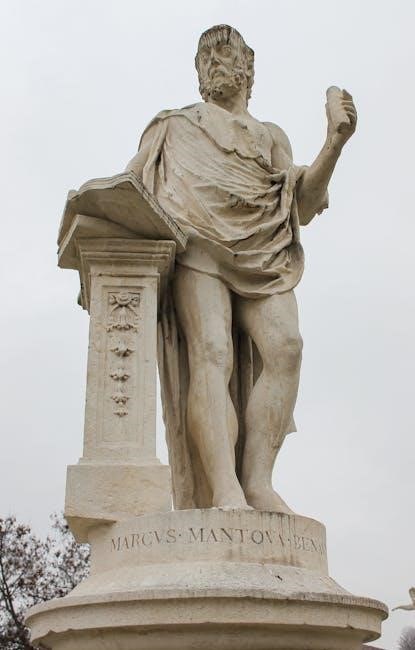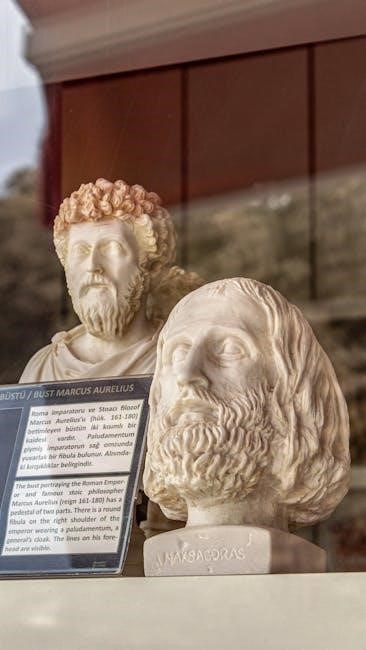Marcus Aurelius‚ a Roman Emperor and philosopher-king‚ is renowned for his profound writings on Stoic philosophy. His works‚ like Meditations‚ offer timeless wisdom on resilience‚ virtue‚ and reason‚ making him a cornerstone of Stoic thought and a guiding light for modern audiences seeking personal growth and ethical clarity.

Biography of Marcus Aurelius
Marcus Aurelius‚ born into a noble family‚ rose to become Rome’s emperor‚ ruling with wisdom during turbulent times. His writings‚ reflecting deep introspection‚ were never meant for publication‚ offering profound insights into his thoughts and struggles as a leader and philosopher.
Early Life and Education
Marcus Aurelius was born into a noble family in Rome‚ raised in a wealthy household‚ and educated in Greek and Roman literature. His upbringing emphasized philosophy‚ with tutors like Herodes Atticus shaping his intellectual foundation. Aurelius’s early life was marked by a deep commitment to learning and moral development‚ which later influenced his Stoic philosophy. His education laid the groundwork for his future role as both a philosopher and a leader.
Reign as Emperor and Historical Context
Marcus Aurelius ruled Rome during a period of significant turmoil‚ including wars with Germanic tribes and the Antonine Plague. His reign‚ from 161 to 180 AD‚ was characterized by wisdom and justice‚ earning him the title of the “Philosopher King.” Aurelius’s leadership during crises demonstrated his commitment to Stoic principles‚ focusing on duty‚ resilience‚ and the well-being of his people; His historical context shaped his writings‚ reflecting the challenges of his time and offering timeless insights into leadership and virtue.

Key Themes in His Writings
Marcus Aurelius’s writings emphasize Stoicism‚ self-reflection‚ and ethical living‚ offering insights into personal growth‚ resilience‚ and moral philosophy; His works remain a cornerstone of modern thought.
Stoicism and Its Principles
Stoicism‚ as outlined by Marcus Aurelius‚ centers on reason‚ self-control‚ and indifference to external events. It emphasizes logic‚ physics‚ and ethics‚ guiding individuals to embrace inner strength and virtue. Aurelius’s writings advocate for accepting life with equanimity‚ focusing on what is within one’s control‚ and cultivating a mindset that prioritizes moral integrity and resilience in the face of adversity. His philosophy remains a powerful framework for navigating life’s challenges with wisdom and clarity.
Self-Reflection and Personal Growth
Marcus Aurelius’s writings highlight the importance of self-reflection as a tool for personal growth. Through journaling‚ he examined his thoughts‚ emotions‚ and actions‚ fostering self-awareness and moral improvement. His practice of introspection encouraged individuals to confront their weaknesses and strive for virtue‚ emphasizing the value of continuous learning and self-improvement. This introspective approach remains a cornerstone of personal development‚ offering timeless insights into cultivating emotional intelligence and inner strength.
Ethics and Moral Philosophy
Marcus Aurelius’s philosophy centers on ethical living‚ emphasizing reason‚ justice‚ and self-discipline. He believed individuals should align their actions with universal reason‚ prioritizing the common good. His writings advocate for treating others with fairness and compassion‚ regardless of their actions. Aurelius’s moral framework‚ rooted in Stoicism‚ encourages individuals to cultivate inner virtue and embrace their role in the larger social fabric‚ providing a guiding ethical compass for both personal and societal harmony.

Modern Relevance of His Philosophy
Marcus Aurelius’s teachings on resilience‚ emotional intelligence‚ and ethical leadership remain highly relevant today‚ offering practical wisdom for personal growth and decision-making in contemporary life.
Stoicism in Contemporary Life
Stoicism‚ as articulated by Marcus Aurelius‚ has seen a resurgence in modern times. Its principles‚ such as focusing on what can be controlled and embracing challenges as opportunities for growth‚ resonate with individuals seeking mental clarity and emotional resilience. The philosophy is applied in various contexts‚ from personal development to workplace strategies‚ offering a timeless framework for navigating life’s complexities with equanimity and purpose.
Applications in Personal Development
Marcus Aurelius’s teachings are widely used for personal growth‚ emphasizing self-reflection and mindfulness. His writings encourage individuals to cultivate inner strength‚ letting go of external validation and focusing on their core values. Techniques like journaling and meditation‚ inspired by his practices‚ help people develop emotional intelligence and resilience. His philosophy serves as a practical guide for overcoming obstacles and achieving a balanced‚ fulfilling life in today’s fast-paced world.
Leadership and Management Insights
Marcus Aurelius’s writings offer profound insights for effective leadership‚ emphasizing integrity‚ humility‚ and justice. He advocates for leaders to prioritize the common good‚ remain composed under pressure‚ and lead by example. His philosophy encourages empathy‚ self-awareness‚ and ethical decision-making‚ providing timeless guidance for modern managers and leaders striving to foster a positive and productive environment within their organizations.

Practical Applications of His Teachings
Marcus Aurelius’s teachings emphasize journaling‚ mindfulness‚ and resilience. His philosophy encourages emotional intelligence‚ self-reflection‚ and ethical decision-making‚ offering practical tools for personal growth and daily life challenges.
Journaling for Emotional Intelligence
Marcus Aurelius’s practice of journaling‚ as seen in Meditations‚ serves as a powerful tool for emotional intelligence. By documenting his thoughts and reflections‚ he cultivated self-awareness‚ processed emotions‚ and aligned his actions with Stoic values. This habit‚ now emulated by many‚ helps individuals identify patterns‚ challenge negative thoughts‚ and develop resilience. Aurelius’s journaling underscores the importance of introspection in managing emotions and fostering inner peace‚ making it a timeless method for personal growth and emotional mastery.
Mindfulness and Daily Practices
Marcus Aurelius’s philosophy emphasizes mindfulness and daily practices as essential for cultivating inner strength. In Meditations‚ he advocates for reflecting on life’s fleeting nature and focusing on what truly matters. His morning reflections‚ documented in his writings‚ highlight the importance of starting the day with purpose and clarity. Aurelius’s teachings encourage embracing the present‚ accepting what lies beyond one’s control‚ and nurturing resilience through consistent‚ mindful habits. These practices remain relevant today‚ offering a practical guide to living with intention and balance.
Cultivating Resilience
Marcus Aurelius’s teachings offer profound insights into cultivating resilience through adverse circumstances. In Meditations‚ he emphasizes accepting challenges as natural parts of life‚ using them as opportunities for growth. Aurelius advocates for focusing on what is within one’s control and letting go of external distractions. His philosophy encourages a mindset of endurance‚ viewing obstacles as mere stepping stones toward wisdom. By embracing this approach‚ individuals can build inner strength and navigate life’s difficulties with equanimity and grace‚ aligning with Aurelius’s timeless wisdom.

Reception and Criticism
Marcus Aurelius’s writings have historically been praised for their wisdom‚ but modern critics examine their practicality and relevance in contemporary contexts.

Historical Reception of His Works
Marcus Aurelius’s Meditations were initially private reflections‚ not intended for publication. They gained prominence posthumously‚ becoming a cornerstone of Stoic philosophy. Over centuries‚ scholars and philosophers admired their depth‚ while lay readers found practical wisdom. The work’s accessibility and timeless insights have ensured its enduring relevance across historical periods‚ making it a bridge between ancient thought and modern seekers of wisdom. Its accidental survival highlights the serendipity behind its lasting influence.
Contemporary Criticism and Debates
Marcus Aurelius’s writings‚ particularly Meditations‚ are celebrated for their timeless wisdom but also face modern scrutiny. Some critics argue that his Stoic ideals may overlook systemic injustices‚ potentially encouraging passive acceptance. Others praise his emphasis on personal resilience and ethical living‚ seeing it as a counter to modern narcissism. The availability of his works in PDF formats has broadened their reach‚ sparking debates on their relevance in addressing contemporary societal challenges and individual struggles‚ ensuring his philosophy remains a focal point of discussion and reflection.

Digital Resources and PDF Availability
Marcus Aurelius’s works‚ such as Meditations‚ are widely available in PDF formats online‚ offering easy access to his timeless wisdom and practical Stoic advice for modern readers.
Sources for Accessing His Works in PDF
Marcus Aurelius’s writings‚ including Meditations‚ are widely available in PDF format through various online platforms. Google Books‚ Project Gutenberg‚ and academic databases offer free access to his works. Additionally‚ websites like LibGen and ManyBooks provide downloadable versions‚ ensuring his philosophical insights remain accessible to a global audience. These digital resources allow readers to explore his teachings on Stoicism and personal growth with ease and convenience.
Popularity of Digital Formats Today
The rise of digital formats has significantly boosted the accessibility of Marcus Aurelius’s works. PDF versions of Meditations and other writings are in high demand‚ catering to modern readers who prefer e-books for convenience. Platforms like Amazon Kindle‚ Google Books‚ and online libraries have made it easier than ever to download and read his philosophical texts. This trend reflects a growing interest in Stoic philosophy and the timeless relevance of his teachings in today’s fast-paced world.

Educational Use of His Works
Marcus Aurelius’s writings are widely used in academic curricula and self-education‚ offering insights into Stoic philosophy‚ ethics‚ and personal growth‚ enriching both formal and lifelong learning journeys;

Academic Study and Curriculum Inclusion
Marcus Aurelius’s writings‚ particularly Meditations‚ are integral to academic curricula in philosophy‚ history‚ and ethics. His works are studied for their insights into Stoicism‚ leadership‚ and moral philosophy. Universities worldwide incorporate his texts to explore ancient Roman thought and its relevance to modern ethical dilemmas. PDF versions of his works‚ such as Meditations‚ are widely used in classrooms‚ enabling students to engage with his ideas digitally. His writings serve as primary sources for understanding Stoic principles and their application in historical and contemporary contexts.
Role in Self-Education and Lifelong Learning
Marcus Aurelius’s writings‚ such as Meditations‚ serve as a powerful tool for self-education and lifelong learning. His journaling practice‚ documented in PDF formats‚ offers insights into personal growth‚ self-reflection‚ and ethical living. Readers can engage with his Stoic principles‚ fostering resilience and wisdom. His works encourage individuals to embrace continuous learning‚ making them a timeless resource for personal development and intellectual enrichment.
Marcus Aurelius’s enduring legacy lies in his profound wisdom‚ captured in works like Meditations‚ now widely accessible in PDF formats. His teachings on Stoicism‚ resilience‚ and ethical leadership continue to inspire modern audiences. Through his writings‚ Marcus Aurelius remains a timeless guide for personal growth‚ fostering a deeper understanding of human nature and the pursuit of virtue. His philosophy‚ rooted in self-reflection and reason‚ offers invaluable insights for navigating life’s challenges‚ ensuring his relevance for generations to come.




About the author